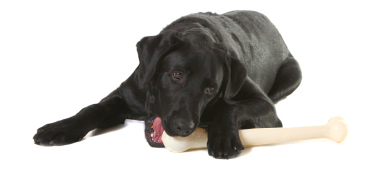Are Rawhide Chews Safe For Dogs?
Rawhide chews have been the treat of choice for dogs and their owners for more than fifty years. They were introduced as a healthy alternative to chewing on shoes or furniture, and as a way to keep the dog's teeth and gums healthy. Many veterinarians recommend rawhide chews to help with your dog's dental health with a few cautions. However, some vets are very much opposed to the practice of giving these treats to dogs, citing cases where pieces of rawhide became lodged in the throat or intestines of dogs.
"Research has show that chewing rawhide helps clean teeth and can reduce the development of dental disease, and rawhide treats are much less likely than bones or hooves to damage a dog's teeth. And chewing rawhide is fun for most dogs," cites an article in the San Francisco Chronicle written by Dr. Brennen McKenzie of Adobe Animal Hospital in Lost Altos.
The article continues, "Concerns about dangerous chemicals in rawhide treats do not appear justified. However, as with any good product, there is a possibility of bacterial contamination, and rawhide products are sometimes recalled for this reason."
And when it comes to rawhide causing intestinal blockage or being a choking hazard? With precautions, rawhide can be a safe treat for your dog. "Rarely, rawhides cause obstructions in the throat or stomach of dogs that swallow large pieces.," writes Dr. McKenzie. "Dogs that tend to do this should be given rawhides too large to swallow, and the treats should be taken away when the dog has torn off chunks or softened..."

How Do You Decide?
It’s safe to say there are negatives and positives to the practice of giving these treats to your dog. The best advice will come from your veterinarian, who knows the size, age and breed of your dog. Here are some pros and cons, and some steps you can take to make sure your dogs are safe if you and your vet decide to allow them to chew rawhide.
Pros
• Satisfies the urge to chew
• Helps keep teeth clean
• Enjoyable for the dog
Cons
• Can break into small pieces that are a choking hazard
• Can get soft and mushy, and stuck in the throat because they mold to the shape of the throat
• Can cause intestinal blockage
• Not regulated by FDA because they are not classified as food
Precautions
There are risks involved whenever a dog chews on items that can break into small pieces or become lodged in the throat or intestines. Taking some simple precautions will help keep your pet safe.
• Always supervise when allowing your dog to chew on a rawhide dog chew or rawhide dog bone, and remove the treat when it becomes small enough for the dog to swallow.
• If you decide to purchase rawhide chews, be sure to get top quality rawhide dog chews and rawhide dog bones produced within your country to reduce the possibility of contamination.
• Offer rawhide chews that are appropriate for the individual dog's size and weight.
• If a dog shows evidence of skin or gastrointestinal problems after chewing on rawhide chews or rawhide bones, discontinue the rawhide product and if symptoms don’t clear up, be sure to consult with your veterinarian.
Alternatives
If the vet indicates that rawhide chews are unsafe for your particular dog, there are many alternatives on the market that are made of rubber, nylon or beef. You can buy beef shank or marrow soup bones at the grocery store, cook them, and give these to the dogs to chew on. Some of the other great alternatives you may want to consider include:
• Nylabones
• Healthy Edibles Natural Dog Chews
• Dental Chews
• Pigs' ears
• Deer antlers





